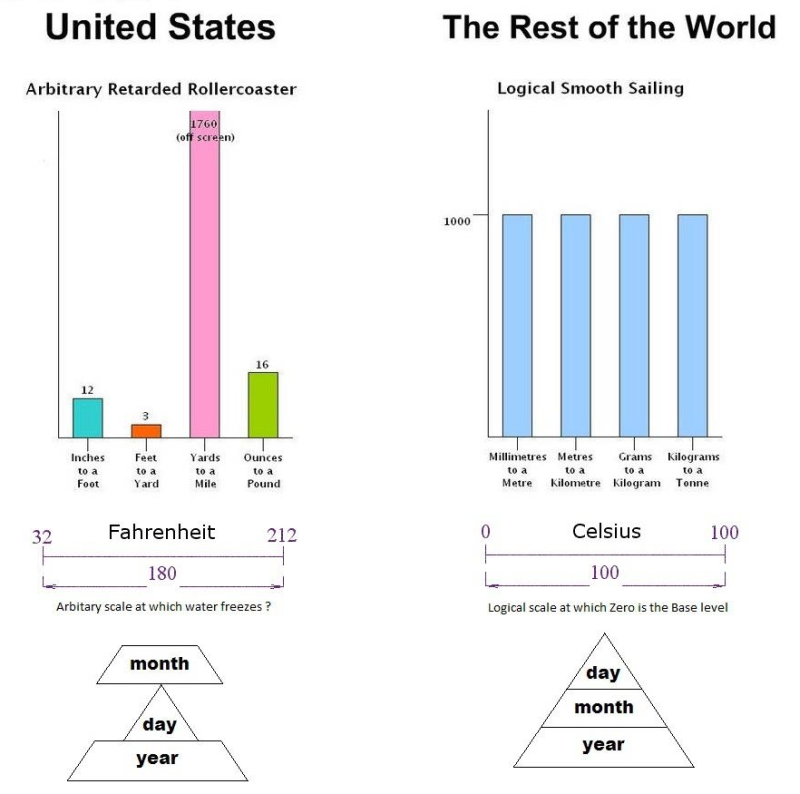this post was submitted on 30 Jun 2023
135 points (88.6% liked)
Standardization
460 readers
1 users here now
Professionals have standards! Community for all proponents, defenders and junkies of the Metric (International) system, the ISO standards (including ISO 8601) and other ways of standardization or regulation!
founded 2 years ago
MODERATORS
you are viewing a single comment's thread
view the rest of the comments
view the rest of the comments

The choice of water's melting and boiling point as two points in the Celsius scale is arbitrary, too. Why not choose the melting and boiling point of something like Cesium? It would have been more fun because who doesn't like Cesium? And it could still use °C. Humans can live in a comfortable 3 degree range in this new system. All of the other units which include temperature can be reconfigured to use this system just as easily as Celsius. We can massage everything so the Joule, etc. is based on 1°C (Cesium, not Celsius!)
I'm not defending the Imperial system. I'm just pointing out the Celsius system is based on arbitrary choices, too.
100°C as the boiling point is hugely useful for things like cooking and hot beverages. The freezing point is useful for road conditions and farming.
Fahrenheit's arbitrariness feels a lot more arbitrary.
How is memorizing 100 any easier than memorizing 212? It's the same brain space. When you're born into the system, it just makes sense. Same with 32 for freezing. Remembering any two arbitrary numbers is really, really easy.
Personally, I'd rather have been raised on metric, but I'm telling you... the Fahrenheit system is no harder than Celsius.
Now fractional inches... Ugh. I do woodworking and I'd much, much rather work in mm, but "every" tool in the US and nearly every enthusiast-level technical drawing is in inches. That and all of my decades of experience is in inches, so I can easily reason about the numbers, and estimate sizes. At least in machining we use decimal inches and not fractions.
Round numbers are easier to remember.
Not only round numbers, but 0 and 100!
0 is obviously a very distinct number.
We use 100 for percentages, money, and all sorts of things.
As someone who wasn't raised in the imperial system, I always have to try to remember if it's 32 or 34. I doubt anyone who hears about the metric system is wondering whether it's 0 or something else like 2 or 10 or whatever.
Freezing water is useful to everyday life, as you need to know if there's ice on the road. So having that be a simple number makes sense
A nice, even number like 32. I agree!
Kinda like knowing that if someone's temperature is over 100 they're probably too hot and there might be a problem. That's an easy number for me to remember. Do you have a problem remembering 37? Cuz I can remember 32.
The point I was responding to was claiming that the definition of the centigrade scale is arbitrary when compared to everyday life, which its clearly not.
Both obviously claim to have neater numbers for everyday life, and the change from F to C doesn't really fit in with the argument of decimalisation like everything else, but you do have to ask why americans dont want to modernise like the rest of the world
A lot of us do. Engineers and scientists all use metric. Anyone who uses tools hate the they need to have two different sets of wrenches or whatever else. I personally find it annoying when I hear something in Celsius or metric and need to do a mental conversion (which a lot of us can't do). I think we should switch over to metric, but a lot of us don't like the change. And as much as I wouldn't be that opposed to switching to Celsius, I don't see much value in that specific metric
The value is in standardisation with the rest of the world, so you wouldnt need to convert.